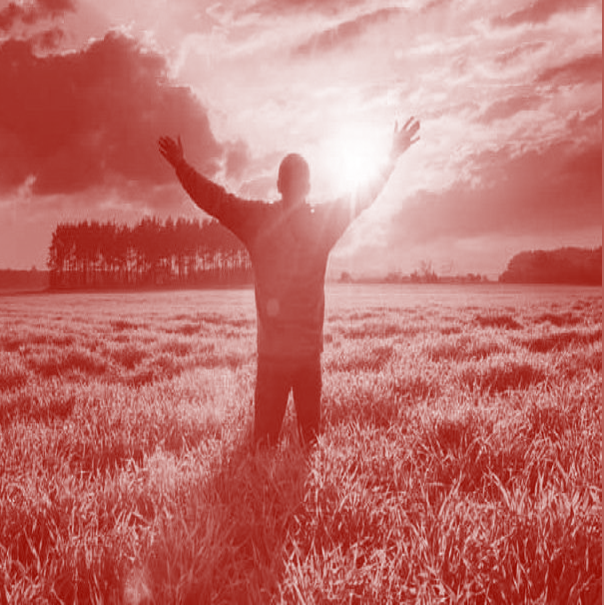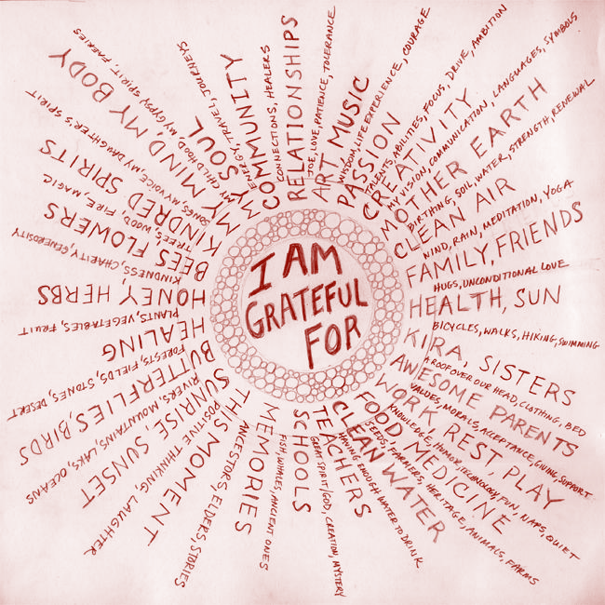
the power & promise of appreciation
The practice of appreciation is an important foundation of positively evolving the character of individual communitarians, along with cementing cooperative giving relationships within the local, regional and global communal unions as well as the wider world.
While most people consider gratitude a virtue, it is true to say that showing appreciation is not always pleasurable, nor does it come naturally or comfortably in all circumstances. It is for these reasons that communitarians recognize that gratitude must be continually developed and cultivated to achieve the attendant benefits. Through practicing gratitude, individuals contribute to the moral elevation of the communal unions by learning to show appreciation for the support and uplift provided by others, thus making a positive difference in the world.
Greeting the dawn with gratitude for life

In the second year of association, communitarians adopt the practice of rising the hour before dawn to fulfill the daily observances of ‘alignment’, ‘mission’ and ‘conscious Creation’. With these vital directing instruments firmly established, it is common practice for those living in union to ‘wait upon the rising sun’ in order to fully appreciate the gift of life – the gift of the new day that freely gifts abundant opportunities to live and love in union via the support, friendship and affection of others of like-mind and devotion to the principles and practices of sharing all with all.
By making the effort to rise before dawn to witness the birthing of a new day, communitarians consistently reinforce their commitment to maintain the practice of appreciation for life, love and unity that serves three moral functions in their lives. First; installing gratitude as a moral barometer keeps the path to right thoughts, right speech and right action, ever before us. Secondly, utilizing appreciation provides communitarians with a moral reinforcer that feeds, waters and tends, as it were, the most evolved array of character traits capable of ‘raising up’ the operative foundations of peace, love and generosity within the communal unions. Thirdly, embedding thankfulness into our psyche, supplies the moral motive to return the good bestowed upon us by others, and also act as responsible custodians of the gifts freely and abundantly given by nature throughout our every waking and resting hour.
Communitarians who observe gratitude as a daily practice, attest to feeling appreciation more intensely, more frequently, more densely and toward more people. Those that practice daily sessions of conscious appreciation also attest to reaping a wide array of benefits, including: increased self-esteem, self-love and love for those around them, together with appreciation for their own personal circumstances, gifts and talents as well as contributions bestowed by others.
When rising early to practice gratitude, communitarians overcome the physical and emotional challenges of ‘greeting the dawn’ by focusing on the rich rewards supplied by expanding appreciation for life, love and union. The rewards are many, including greater kindness, expanded happiness and increased positive mental and physical health.
developing an appreciative character

As a moral virtue, gratitude is less an inborn trait than a characteristic of personality that necessitates intentional training, via modelling, as well as, cultivation via routine practice to install it as habit – or ‘second nature’. In recent times much has been studied and learned regarding the pathology of the moral characteristics of gratitude and its effects on individuals, as well as, impacts on societies’ functions and facilities. Gratitude researcher, Robert Emmons, defines the grateful person as someone who has overcome the tendency to take things for granted, and who also feels no entitlement to the benefits received, as well as, a person who is able to give others credit for the advantages they have, above and beyond those with lessor or without advantages.
For some, creating lists and journals of all they appreciate, turns out to be the perfect path to establishing enduring feelings of gratitude and happiness that lead onto the motivation to be consistently generous and progressively productive. However, others may have a harder time accepting the tenets of positive psychology that seek to rouse genuine thankfulness from within those who feel they have valid reasons to resist showing gratitude for circumstances of life, love and union that do not in any way shape or form, provide a quality of life that meets with satisfaction. In these cases, making gratitude lists, especially in times of stress, depression or deprivation of health, support and liberty, comes across as feigning happiness and thereby perceived as glossing over reality.
For those struggling to appreciate personal circumstances which may include severe lack and limitations, reversal of negative situations, often comes via understanding that behaviour precedes incitement of corresponding desired feelings and emotions. In other words, if we summon the courage and determination to ‘act as if’, often the desired feelings and emotions, follow. Conversely, if we wait to feel confident before acting – action rarely proceeds. However, if forced to take that same action regardless of our feelings of readiness – confidence arises by way of the action’s accomplishment. In the case of gratitude, it is only by acting ‘as if’ we are grateful for all that we have and hold, that we are able to discover the power and confidence within.
In their personal lives, communitarians extend the group practice of gratitude by being mindful to put a smile on their faces, even in private; raise their hands to the sky morning and evening in appreciation for the gift of life, love and union that the day has bestowed upon them; dance in the light of dawn; sing with the birds as an act of union with all creatures great and small; kiss the ground beneath their feet as an act of thankfulness for the gifts of its nourishment; hug a tree for appreciation of the clean air it provides; and cleanse in the streams, rivers and seas as an act of reverence for the gifts of life-giving water.
While it is important to recognise that ‘gratitude’ must be a nurtured emotion, it is equally essential to realize that ‘gratitude’ is also a key value that needs to be evolved and continually cultivated, refined and raised within our characters. The undeniable truth is that we all begin life dependent on others, and most of us will end our lives in a similar position. In the interim between birth and death most of us will also depend on others for physical, emotional and financial support, either directly or indirectly.
Through daily practice of gratitude, communitarians acknowledge that they did not fashion themselves, nor did they give birth to themselves. By giving thanks for life itself, communitarians demonstrate the understanding that Life is given meaning when we practice appreciation for the many opportunities to give and receive as well as repay the kindness, generosity, love and support gifted to us by others.
Gratitude journalling

Making space within the morning and evening reflective journal processes to record all we appreciate, cultivates recognition of the valuable contributions others make to our daily life, liberty and happiness. In turn, increased awareness of the generosity of others supplies the fuel to generate willingness to help others needing emotional or physical support.
On a daily basis, taking the time to write down everything we are thankful for, proves to increase optimism. In turn, optimism improves the soil that grows wellbeing, pro-sociality, health and happiness, as well as, waters overall contentment. Those who take the time to list all they are grateful for, report they found the remedy for overcoming depression and anxiety, as well as, suffering fewer bouts of illness, reduced stress, along with experiencing more peaceful and refreshing sleep.
Growing gratitude through gestalt practice

Initially, the term associated with the communitarian union practice of ‘Proving’ appears an alien concept. However, ‘Proving’ will be better understood when associated with the process of ‘rising’ bread – leaving it to ‘raise.’ In baking, proving is a step in the preparation of yeast bread and other baked goods where the dough is allowed to rest and rise a final time before baking. During this rest period, yeast ferments the dough and produces gases, thereby leavening the dough.
Similarly, the practice of gratitude leavens – raises, prepares and matures the individual and group characteristics of peace, harmony, love, affection, generosity, sharing and joy within the communal unions.
For this reason, a vital component of the Gestalts consists of progressing communitarians through the process of recognizing, and reversing, the ‘erosion of sense’ inflicted on all of humankind, by imposed structures of competitive and generational separatism. Through participation in the weekly ‘Gestalt Gatherings’ participants come to understand that resistance to appreciating their material and relational circumstances, can never be defeated by ‘waiting’ to feel the emotions that belong to an appreciative heart that would otherwise lead to abundant expressions of joy and even elation. Recognizing that living estranged from deep-abiding support and fellowship is the real cause of hardship and isolation, gestates ‘a change of heart’ for our own suffering, as well as, installs active compassion and understanding for others who display negative emotions and anti-social behaviors.
An important step toward restoring natural energy, reverence and passion for life, communal love and union, is attained via the realization that separatist societal and economic chaos has caused ‘gratitude’ to go underground; and will remain a rare natural emotion while societies continue to be so disarranged. Through participation in the Gestalt gatherings, communitarians learn to excavate natural gratitude from its ‘hiding places’ within the authentic personality. By bringing real joy and thankfulness to the surface, a light is shone on the path toward enduring peace and harmony, along with all associated gifts including shared ‘common wealth secure prosperity.
Giving thanks for nourishment

For many centuries and across a range of cultures, pausing to express gratitude for the food available to nourish our bodies, has been an ever-present part of daily life. Those who take the time to appreciate the gift of nourishment, sincerely believe that the practice of gratitude, in all its forms, endowers their lives with meaning and a sense of unity with all those involved in providing their sustenance.
Likewise, communitarians who practice conscious appreciation for their meals, are certain that reflecting on the gifts before them, helps them be more present and also enjoy the eating experience more fully. For many, it would be unthinkable to just devour the meal and not give thanks to the earth, the rains, the springtime sunshine, the seeds, the animals’ manure. The practice of gratitude also helps us appreciate the great communal effort that goes into growing, harvesting, and preparing each ingredient.
